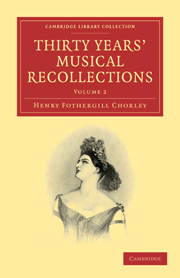Book contents
- Frontmatter
- Contents
- THE YEAR 1847
- THE YEAR 1848 (Her Majesty's Theatre.)
- THE YEAR 1848 (Royal Italian Opera.)
- THE YEAR 1849 (Her Majesty's Theatre.)
- THE YEAR 1849 (Royal Italian Opera.)
- THE YEAR 1850 (Her Majesty's Theatre.)
- THE YEAR 1850 (Royal Italian Opera.)
- THE YEAR 1851 (Her Majesty's Theatre.)
- THE YEAR 1851 (Royal Italian Opera.)
- THE YEAR 1852 (Her Majesty's Theatre.)
- THE YEAR 1852 (Royal Italian Opera.)
- THE YEAR 1853 (Royal Italian Opera.)
- THE YEAR 1854 (Royal Italian Opera)
- THE YEAR 1855 (Royal Italian Opera.)
- THE YEAR 1856 (Her Majesty's Theatre.)
- THE YEAR 1856 (Royal Italian Opera.)
- THE YEAR 1857 (Royal Italian Opera.)
- THE YEAR 1857 (Her Majesty's Theatre.)
- THE YEAR 1858 (Her Majesty's Theatre.—Royal Italian Opera.—Drury Lane.)
- THE YEAR 1859 (Royal Italian Opera.—Drury Lane.)
- The Last Chapter
THE YEAR 1848 (Royal Italian Opera.)
Published online by Cambridge University Press: 29 August 2010
- Frontmatter
- Contents
- THE YEAR 1847
- THE YEAR 1848 (Her Majesty's Theatre.)
- THE YEAR 1848 (Royal Italian Opera.)
- THE YEAR 1849 (Her Majesty's Theatre.)
- THE YEAR 1849 (Royal Italian Opera.)
- THE YEAR 1850 (Her Majesty's Theatre.)
- THE YEAR 1850 (Royal Italian Opera.)
- THE YEAR 1851 (Her Majesty's Theatre.)
- THE YEAR 1851 (Royal Italian Opera.)
- THE YEAR 1852 (Her Majesty's Theatre.)
- THE YEAR 1852 (Royal Italian Opera.)
- THE YEAR 1853 (Royal Italian Opera.)
- THE YEAR 1854 (Royal Italian Opera)
- THE YEAR 1855 (Royal Italian Opera.)
- THE YEAR 1856 (Her Majesty's Theatre.)
- THE YEAR 1856 (Royal Italian Opera.)
- THE YEAR 1857 (Royal Italian Opera.)
- THE YEAR 1857 (Her Majesty's Theatre.)
- THE YEAR 1858 (Her Majesty's Theatre.—Royal Italian Opera.—Drury Lane.)
- THE YEAR 1859 (Royal Italian Opera.—Drury Lane.)
- The Last Chapter
Summary
This year placed the artistic success of the new opera theatre beyond possible question.—Rumours were circulated before the curtain of the Haymarket Opera House with eager alacrity, speaking of wreck and ruin as imminent; and these were proved not to be baseless by subsequent disclosures in the law-courts, of heavy losses endured by the original capitalists.—But to close a theatre in which a public finds enjoyment, and from which good things are to be expected, is a catastrophe harder to bring about than the outer world, unaware of the fascination of such speculations, could be readily made to believe.—Musically, the performances at the Royal Italian Opera were of a magnificence which entirely bore down the attraction of the rival theatre—great and intoxicating as it was, in the presence of a singer who had driven the world, sacred and profane, well-nigh frantic. The productions of “La Favorita” and “Les Huguenots,” on a scale of splendour totally unattempted before, settled the question of character, with a decision beyond all power of cavil or cabal to shake.
The former opera—Donizetti's best serious work—had never till then been relished in England. In truth, to counterbalance the painful nature of the story, it required, for this country, such impassioned singing and acting as those of Madame Grisi and Signor Mario, and such a lavish splendour of pictorial decoration and choral solemnity as was thrown into the impressive monastery-act. Even with all these advantages and accessories, “La Favorita” has never been so popular with us as “Lucrezia Borgia,” though it is by much the finer opera of the two.
- Type
- Chapter
- Information
- Thirty Years' Musical Recollections , pp. 28 - 60Publisher: Cambridge University PressPrint publication year: 2009First published in: 1862



